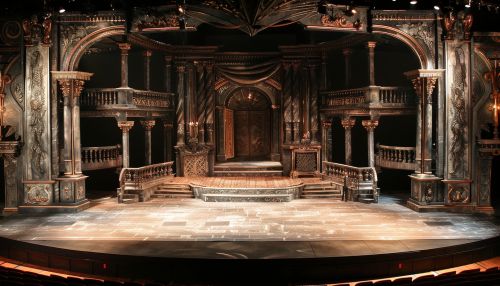Play (theatre)
Origins and History
The concept of theatre as a form of artistic expression dates back to ancient times. The earliest recorded theatrical event dates back to 2000 BC in Ancient Egypt. The Greeks were the first to present dramatic presentations as part of their religious rituals. In the 5th century BC, the Greeks began to write plays for competition and festival celebrations. The Romans also contributed to the development of theatre, particularly through the expansion of the genres of tragedy and comedy.
Elements of Play (Theatre)
A play in theatre is a form of literature written by a playwright, usually consisting of dialogue or singing between characters, intended for theatrical performance rather than just reading. Plays are performed at a variety of levels, from Broadway, Off-Broadway, regional theatre, to Community theatre, as well as University or school productions. There are rare dramatists, notably George Bernard Shaw, who have had little preference whether their plays were performed or read. The term "play" can refer to both the written works of playwrights and to their complete theatrical performance.
Characters
Characters are one of the primary elements of a play. They are the people portrayed by the actors in the play. They can be either protagonists (heroes), the main characters around whom the whole story revolves, or antagonists, the ones who oppose the protagonists. Often there are characters who are neither heroes nor villains, but just help in developing the storyline.
Plot
The plot refers to the sequence of events inside the play which are driven by the conflict between the protagonist and the antagonist. The plot can be divided into several components: exposition, rising action, climax, falling action, and resolution.
Theme
The theme of a play refers to its central idea which may be either direct or indirect. It could be a moral lesson or an ongoing theme throughout the story, such as love, war, revenge, betrayal, fate, etc.
Dialogue
Dialogue refers to the conversation or interactions between the characters in the play. The characters speak the dialogue, which can either be short phrases or long speeches. Dialogue is essential to the action of a play, because it defines the characters and moves the action of the play.
Music and Sound
Music and sound are used in plays for a variety of purposes, such as providing background, setting the mood, supporting the plot, and for character development. Sound can be used to indicate character arrival or exit, off-stage noises, and other effects.
Spectacle
Spectacle refers to the visual elements of a play, including sets, costumes, special effects, etc. Spectacle can also include elements of a play that contribute to its overall impact, such as dance and mime.
Types of Play (Theatre)
There are many types of plays in theatre, including tragedies, comedies, melodramas, farces, historical plays, musicals, and more. Each of these types has its own characteristics and rules.
Tragedy
Tragedy is a type of drama that presents a serious subject matter about human suffering and corresponding terrible events in a dignified manner.
Comedy
Comedy is a type of drama that is intended to be humorous or amusing by inducing laughter, especially in theatre, television, film, and stand-up comedy.
Melodrama
Melodrama is a genre that emerged in the 19th century and is characterized by a plot that appeals to the heightened emotions of the audience.
Farce
Farce is a type of comedy that uses absurd and highly improbable events in the plot. Situations, characters, and even setting can be ridiculous in a farce.
Historical Play
Historical Play is a type of play that takes its storyline from a historical event or period.
Musical
Musical is a type of play where music, songs, and dance form an integral part of the story.
Play Structure
The structure of a play is always dictated by its genre. The most basic structure of a play is: exposition, conflict, rising action, climax, falling action, and resolution.
Playwriting
Playwriting is the art of writing plays. Playwrights are the authors of plays. The process of writing a play requires a deep understanding of human behavior, a knack for dramatic structure, and the ability to imagine what might be dramatically effective on stage.
Performance
The performance of a play involves actors embodying the characters and performing the dialogue and actions before an audience. The performance of a play is also bound by many conventions of the theatre.
See Also


